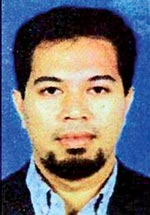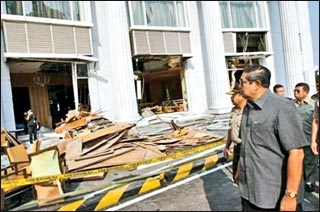Explosive reaction
P.S. Suryanayana
The serial bomb blasts in Jakarta on July 17 are aimed at the
country’s new political awakening.
Terrorism is back with a bang, as it were, on the political agenda of
Indonesia’s fledgling democracy. The serial bomb explosions at two
adjacent luxury hotels in a fashionable district of Jakarta on July 17,
the first major terrorist attack in Indonesia since 2005, have shattered
the euphoria over the peaceful Presidential
|

Noordin Mohammed |
election on July 8 in the Muslim-majority nation. The incidents come
at a time when the country’s polity was poised to soar on its new
democratic wings.
Surely, the democratic exercise, the second direct Presidential
election since the fall of Suharto’s authoritarian regime a decade ago,
did spark some controversies. The election result had not been announced
officially when terrorists struck at the JW Marriott and Ritz-Carlton
hotels. Still in focus then were the ‘quick counts’, or exit polls,
which had given President Susilo Bambang Yudhoyono much cause for
celebration. He was projected to have been re-elected.
The margin of his victory this time was said to have been so huge as
to obviate a run-off, unlike in 2004 when he secured his first mandate
for the post. In such a setting, Yudhoyono’s challengers disputed the
results of the latest ‘quick counts’. The electoral authority’s official
result was still unavailable by July 20.
Despite this, the general view among political pundits and other
politically savvy sections was that Indonesia’s post-Suharto democracy
had come of age on July 8. It was this sense of a political ‘awakening’
that the July 17 terrorist attacks, which claimed nine lives and injured
50 persons, served to undermine, at least for a while. So much so,
questions were raised even in official circles about the possibility of
links between these attacks and the country’s newly evolving political
process. In televised comments, Yudhoyono said those behind the attack
should be punished, regardless of their political links, if any.
The main focus of the investigations was on the Jemaah Islamiyah (JI),
a suspected South-East Asian affiliate of Al Qaeda. Gaining currency as
a key line of probe was the possibility that a ‘breakaway JI leader’,
Noordin Mohammed Top of Malaysia, could have masterminded the attack.
Indonesian police officials reported that the explosives used on that
day were similar to those that the faction had depended on for some
earlier strikes.
Meticulous terror plot
Indonesian police Chief Bambang Hendarso Danuri was of the view that
two suicide bombers were involved in the attack. A preliminary picture
that emerged, on the basis of on-site forensic evidence and
investigations, was that of a meticulous terror plot. The explosive
devices were reckoned to have been assembled in a room in one of the
targeted hotels. The conspirators, it was surmised, had checked in as
guests.
One of the suicide bombers detonated a device at the same hotel where
the bombs were made. His co-conspirator, it was suspected, had gone over
to the adjacent hotel before the operation began. Once there, he
apparently used a computer notebook to detonate another device. These
coordinated detonations occurred within minutes of each other.
What, in particular, confounded the investigators was how the
conspirators had managed to hoodwink the security personnel at these
hotels and, more importantly, fool the terror-alert gadgets that had
been deployed. In fact, elaborate security arrangements, including
physical searches of baggage as deemed necessary, had been put in place
at major Jakarta hotels following the 2003 bombing at the JW Marriott,
which killed 12 people.
|

President Susilo Bambang Yudhoyono near the blast site at the JW
Marriott hotel in Jakarta on July 18. Pictures courtesy google
images |
Bali bombers
The other major terrorist strikes in Indonesia were the 2004 attack
on the Australian embassy in Jakarta and the Bali bombings in 2002 and
2005. Last year the ‘Bali bombers’, who were sentenced to death, were
executed, with no immediate terrorist backlash from either the JI, to
which those convicts belonged or any other group.
Politically, the relative lull on the terror front in Indonesia since
2005 was being widely interpreted as a result of Yudhoyono’s ‘smart
power’. An obvious question in this context is whether the latest
terrorist attacks were simply a backlash for the execution of the ‘Bali
bombers’ or whether a qualitatively new challenge was now taking shape.
Obviously, the answers will take time to emerge.
Not surprisingly, the Yudhoyono administration would not jump to
quick conclusions. The President’s Chief of Staff Dino Patti Djalal told
this correspondent, in a background comment shortly after the terror
strikes, that the investigation would be carried out ‘from the ground
up’ and with ‘an open mind’.
The immediate indication, according to him, was that it is open to
any possibility’ about what those outside the Yudhoyono administration
began to see as a resurgent terrorist challenge.
Courtesy The Frontline |



